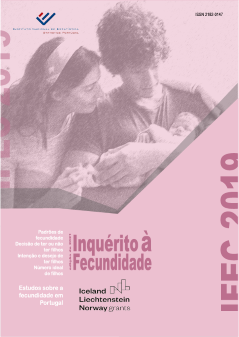
Home :: What’s new
Methodology and technological solutions for the Time Use Survey
Report on the Methodology and Technological solutions for the Time Use Survey.

Completion of the National Statistics System on Gender Equality project

On 30 April 2024, Statistics Portugal held an event on the completion of the National Statistics System on Gender Equality project (Programme and presentations).

Publication - 2019 Fertility Survey
A publication related to the 2019 Fertility Survey was made available containing five studies carried out by academic researchers and technicians from Statistics Portugal.
As mentioned in the Introductory Note to the publication, these studies "far from exhausting the volume of available information, reveal their multiple potential for analytical purposes":
- “To have or not to have children: reasons for the decision”, Maria João Valente Rosa and Isabel Tiago de Oliveira
- “Fertility intentions of young parent groups: a comparative analysis of single parent groups, of “simple” and recomposed couples”, Vanessa Cunha, Susana Atalaia and Sofia Marinho
- “Second child: an uncertain transition”, Rita Brazão Freitas, Andreia Maciel and Maria Filomena Mendes
- “Permanent and voluntary infertility: people without children and with no intention of having them”, Susana Clemente, Rita Lages and Joana Malta
- “Fertility as an advanced indicator of the economic cycle in Portugal”, Jorge M. Bravo

Project presentation National Statistical System on Gender Equality

On July 7, 2021, Statistics Portugal held two events related to the National Statistics System on Gender Equality project: presentation of the project and the actions that comprise ( Part 1: Programme and presentations ) it and presentation and discussion of the main results of the Fertility Survey, having as reference a publication specifically prepared for the purpose ( Part 2: Programme and presentations ) .

Statistics Portugal released on December 3rd the main results of the Fertility Survey

The Fertility Survey, carried out in 2019 by Statistics Portugal, aims to update and reinforce the knowledge about fertility in Portugal.
See here information about the multiple dimensions of this phenomenon for the population in the fertile period, namely their demographic and socioeconomic characteristics (such as age, level of education, migratory background, conjugality or labour status), the fertility already achieved and the desired one, intentions and the desire to have children, the ideal number of children, or the perceptions and constraints that influence the decision to have or not have children.
A wide range of tables with results from the survey were also made available at the same date, as well as the anonymised database for researchers, for purposes of scientific research. Link
